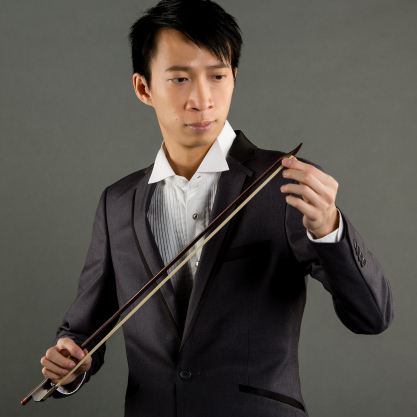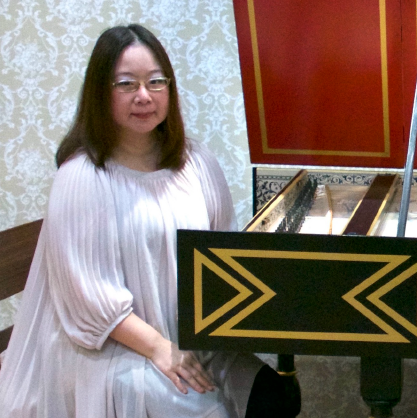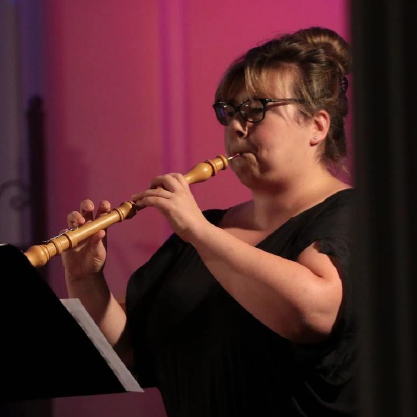
March 11, 2021
Georg Philipp Telemann (1681–1767)
Sonata in F major for violin, bassoon and basso continuo, TWV42:F1
Allegro
Soave
Presto
Baroque violin - Gary Ngan
巴羅克小提琴 - 顏嘉俊
Baroque Bassoon - Karen Yeung
巴羅克巴松管 - 楊嘉倫
Harpsichord (basso continuo) - Dr. Sonia Lee
古鍵琴 (數字低音)- 李敏琪博士
George Philippe Telemann was a prolific German Baroque composer who wrote more than 3,000 compositions using diverse European national styles. A self-taught composer, he originally studied law but later took up music as his profession. His instrumental works were very popular among both professional and amateur musicians both in his time and present days. He wrote for numerous instruments and self-taught himself to play the flute, oboe, recorder, violin, viola da gamba, and other instruments. The Sonata in F major, TWV42:F1 is from his six trio sonatas published in Frankfurt in 1718.
Program notes by Karen Yeung
March 18, 2021
Johann Sebastian Bach (1685–1750)
Musical Offerings, BWV 1079 (1747)
Ricercar a 3
Ricercar a 6
Harpsichord - Kenneth Yeung
古鍵琴 - 楊奇峰
Johann Sebastian Bach’s Musical Offering, BWV 1079 (1747) is a cyclical, variegated work that assembles two keyboard fugues, a trio sonata and ten canons. All these seemingly heterogeneous components are indeed based on the one and same “royal theme,” which was deigned by King Friedrich II of Prussia in Potsdam when Bach attended the evening chamber music gathering and was asked to improvise on the spot. This program features the complementary three- and six-voice ricercars, the first of which reveals Bach’s consummate art of extemporaneous improvisation, and the second of which reveals his ingenious skill in writing contrapuntal, fugal music.
Program notes by Kenneth Yeung
March 25, 2021
Giovanni Battista Sammartini (1700–1775)
Concerto in C major for violoncello piccolo, strings and basso continuo
(Keyboard reduction by Dr. Sonia Lee)
Allegro
Andante sempre piano
Allegro
Five-string violoncello piccolo - Dr. Ka-Wai Yu
五弦高音大提琴 - 余嘉維博士
Harpsichord (basso continuo) - Dr. Sonia Lee
古鍵琴(數字低音)- 李敏琪博士
Eighteenth-century Italian composer Giovanni Battista Sammartini was a leading figure in the development of the Classical style. He composed some of the earliest-dated symphonies prior to Haydn and Mozart. Concerto in C Major for Violoncello piccolo or Violin, strings and basso continuo is one of the first known concertos written for the violoncello piccolo. The manuscript comes from the Westdeutsche Bibliothek in Marburg, Germany and is mentioned in the Breitkopf Catalogue of 1762. Like Sammartini’s other works, this concerto has an intense rhythmic drive and continuity of structure in the outer movements, contrasted by a lyrical middle movement.
Program notes by Dr. Ka-Wai Yu
April 1, 2021
Partimento and Thoroughbass Improvisation
Bernardo Pasquini (1637–1710)
Basso continuo fugue in d minor, from Ms. Add. 31501/II (1708)
Giovanni Paisiello (1740–1816)
Partimento in D Major, Gj2330, from Regole per bene accompagnare il Partimento (1782)
Johann Mattheson (1681–1764)
Grosse Generalbaß-Schule, Teil 3 (1731)
Prob-Stück No. 12 in A-flat major
Prob-Stück No. 20 in B minor
Harpsichord - Kenneth Yeung
古鍵琴 - 楊奇峰
This program focuses on eighteenth-century improvisation in both Italian and German traditions. The Italian partimento tradition is demonstrated by examples of Bernardo Pasquini (1637-1710) and Giovanni Paisiello (1740–1816), whereas the German thoroughbass tradition is illustrated by two “test pieces” (Prob-Stücke) taken from the advanced class of the Grosse Generalbaß-Schule (1731) written by Johann Mattheson (1681–1764). Since the texture of these pieces was only partially written out – encoded on a single staff with figured bass notation – it is ultimately the performer’s interpretation and imagination to transform the shorthanded sketch into a fully-fledged piece of composition.
Program notes by Kenneth Yeung
April 8, 2021
Johann Christian Schickhardt (c. 1682–1762)
Concerto in D minor for four recorders and basso continuo
Allegro
Adagio
Vivace - Allegro
Baroque recorder - Jennifer Tsang
巴羅克木笛 - 曾霆枝
Baroque bassoon (basso continuo) - Karen Yeung
巴羅克巴松管(數字低音)- 楊嘉倫
Harpsichord (basso continuo) - Dr. Sonia Lee
古鍵琴(數字低音)- 李敏琪博士
In view of the relative scarcity of eighteenth-century music for recorder ensemble, the extremely rare use of four treble recorders deserves special attention. The devotee of Baroque flute music will undoubtedly welcome these additions to his repertoire, all the more so since they present no insuperable difficulties, and their composer, who seems particularly happy in the cantabile slow movements and the high-spirited finales, knows how to occupy the four instruments almost throughout as equal partners, hardly one of whom need to feel his function to be that of pure harmonic filling.
Program notes by Jennifer Tsang
April 15, 2021
George Frideric Handel (1685–1759)
Sonata in F Major for oboe and basso continuo, HWV 363a
Adagio
Allegro
Adagio
Bourrée
Menuetto
Baroque Oboe
巴羅克雙簧管 - Agnieszka Mazur
Baroque bassoon (basso continuo) - Karen Yeung
巴羅克巴松管(數字低音)- 楊嘉倫
Harpsichord (basso continuo) - Dr. Sonia Lee
古鍵琴(數字低音)- 李敏琪博士
Handel’s Oboe Sonata in F major HWV 363a was probably written at some point between 1711 and 1716. The sonata offers a vibrant and engaging dialogue between the solo oboe part and the accompanying (basso continuo) instruments. Five contrasting movements represent such typical baroque idioms as dances, ground bass, and imitation, and contain a variety of baroque effects. The sonata was later reworked into a Flute Sonata (G major, HWV363b). The final Minuetto was used again in 1734 in his Concerto Grosso No. 4 in F major Op. 3, HWV315.
Program notes by Agnieszka Mazur
CONCERT VIDEO
Video released on every Thursday (Mar 11 - Apr 15)
Language: Cantonese with English subtitles
YouTube:
HKUST Center for the Arts
Concerto da Camera 雅樂合奏團
Concert I
CONCERT II
CONCERT III
CONCERT IV
CONCERT V
CONCERT VI


CONCERTO DA CAMERA (Hong Kong)
Since its founding in 2004, Concerto da Camera has brought unique, innovative chamber music and arts programs to audiences of all ages and backgrounds. Its programming strives to increase public interest in classical music, and to foster arts and culture. Its events have taken place in both traditional venues and new spaces, such as beautiful heritage sites, offering memorable experiences to the audience. Sponsors of its past projects include the Hong Kong Arts Development Council, Po Leung Kuk, Ming Pao, RTHK, and Alliance Française de Hong Kong.
An advocate of new music, Concerto da Camera regularly commissions and performs works by living and Hong Kong composers, and has received multiple supports from the CASH Music Fund. The organization also collaborates with artists of disciplines outside music.
Visit www.concertodacamera.org.
Concerto da Camera Limited is a registered charitable organization in Hong Kong. You can apply for tax deductible with a receipt for donations of HK$100 or above.

Artists’ biographies

Gary Ngan Ka Chun, violinist and conductor, has performed concerts and recitals extensively in over 70 cities across 5 continents (Asia, Africa, Europe, the North and South Americas) on violins of both modern and historical setup. A distinguished graduate of Yale University and Eastman School of Music, Ngan also studied baroque violin and chamber music at the Hochschule für Musik, Theater und Medien Hannover. He is the First Prize winner at the Eastman Concerto Competition, Montserrat Competition, Vinaròs International Chamber Music Competition in Spain, and holds a Fellowship Diploma from Trinity College, London.
Ngan has appeared with the Asian Youth Orchestra, the Conservatory Project (Kennedy Center) and the New York String Orchestra Seminar (Carnegie Hall), as well as international music festivals such as the Great Mountains (South Korea), Music Master Course (Japan), Norfolk, Northern Lights and Oregon Bach. Besides being the Concertmaster of the Eastman Philharmonia (2007-2009) and the National Orchestral Institute (2006), Ngan has also served as Leader of the Britten-Pears Baroque Orchestra (2018) in the UK, Assistant Concertmaster of the Berwick Academy period orchestra (2016) and Concertmaster of Junges Stuttgarter Bach Ensemble under Internationale Bachakademie Stuttgart found by Helmuth Rilling, touring with them to Chile, Germany, Italy and Tunisia (2012-2014). Recently, Ngan is involved in the unprecedented T19CHIP Research and album recording at the University of Oxford alongside specialists in the field of Historical Performance around the world.
Named a Britten-Pears Young Artist in 2018 and Fellow at the Music Academy of the West in 2008, Ngan was also appointed as Honorary Artist-in-Residence at the Education University of Hong Kong since 2017, Visiting Artist at the City University of Hong Kong (2019-20) and Resident Artist (in Orchestral Direction) at SingFest. Having served nine seasons as the Associate Concertmaster of the City Chamber Orchestra of Hong Kong (2010-2019) and occasionally as their Acting Leader, director and soloist, Ngan taught baroque violin at the University of Hong Kong (2016-2018) and is currently on the faculty of the Hong Kong Baptist University.

Karen Yeung is the founder and artistic director of Concerto da Camera, an active professional chamber music ensemble in Hong Kong since 2004, and a co-founder of the Hong Kong Bassoon Academy, a school offering quality music education since 2010. Under her leadership and vision, Concerto da Camera offers unique, innovative chamber music programs which promote public interest in classical music. Yeung graduated from the Hong Kong Academy for Performing Arts in 2001.
She continued her studies on the modern bassoon at the Conservatorium van Amsterdam under Mr. Ronald Karten, Principal Bassoon of the Royal Concertgebouw Orchestra, and on the baroque bassoon and early music performance studies under Ms. Donna Agrell, bassoonist of The Orchestra of the Eighteenth Century. She has participated in masterclasses given by renowned coaches and historical bassoonists, including Paolo Grazzi and Alberto Grazzi of Ensemble Zefiro (Italy), and Dominic Teresi of Tafelmusik (Canada).

Dr. Sonia Lee has given performances, talks, and masterclasses in nearly 150 cities on four continents. Her performances have been praised by critics as "nicely rendered" (Early Music America Magazine) and possessing "grace and flair" (Sounding Board, UK). She is a laureate of the Mae & Irving Jurow International Harpsichord Competition and the Montréal Baroque Galaxie-CBC Rising Star Competition. A performer on the modern piano and various historical keyboards, she has appeared as a soloist and collaborative artist at numerous festivals and venues, including the early music festivals of Utrecht, Boston and Costa Rica, Nordic Historical Keyboard Festival, Early Keyboard Music Cycle of Buenos Aires, Milwaukee Museum of the Pianoforte, Handel House Museum of London, and the Schubert Club. Her discography includes premiere recordings of rediscovered music of Bembo, Weigl, Kozeluch, and Berg on Mark Records, Arabesque, and other labels. A sought-after adjudicator, she was a member of the jury of the 2019 17th Gianni Gambi International Harpsichord Competition, 2018 Calgary Performing Arts Festival Piano Competitions, and the 2015 Aliénor International Harpsichord Composition Competition. Lee holds degrees in music from the Chinese University of Hong Kong, McGill University, and the University of Illinois at Urbana-Champaign, with additional study in public leadership at the Harvard Kennedy School. She is editor of the peer-reviewed Early Keyboard Journal. Visit www.sonialeemusic.com.

Born in Hong Kong, Kenneth Yeung is a versatile keyboardist and string player. He has been in frequent demand locally and internationally in solo, chamber, continuo and improvisational performances. He is the harpsichord finalist of the 31st International Competition of Early Music, Yamanashi, Japan (2018). He presented recitals in the eighth conference of Historical Keyboard Society of North America at Sam Houston State University School of Music and in the second International Conference on Performance and Creativity: Historical Keyboard Music 1700-1850 at Hong Kong Baptist University. He participated such summer festivals as Berwick Academy of Oregon Bach Festival (U.S.) and Smarano Organ Academy (Italy).
Yeung has worked and performed with John Butt, Elizabeth Blumenstock, Bojan Čičić, Bruce Dickey, Jeffrey Thomas, Matthias Maute, Julie Andrijeski, Scott Metcalfe and Cléa Galhano. He participated masterclasses and received private instructions from Pierre Hantaï, Arthur Haas, Christophe Rousset, Mitzi Meyerson, Enrico Baiano, Costantino Mastroprimiano, Edoardo Bellotti, etc. He is also a recipient of major scholarships, notably Irving & Lena Lo Fellowship, International Enhancement Grant and Mary Coffman Tilton Harpsichord Fellowship.
Yeung received Bachelor of Arts (Music) from The Chinese University of Hong Kong with First Class Honours, majoring in modern cello. He continued to receive his Master of Music in Historical Performance at Oberlin College. He studied harpsichord with Mark Edwards and Webb Wiggins, fortepiano and clavichord with David Breitman, organ with James Christie, and viola da gamba and baroque cello with Catharina Meints.
Currently, Yeung is a doctoral candidate with Distinction in Early Music Performance on historical keyboards under the tutelage of Elisabeth Wright at the Jacobs School of Music, Indiana University. He also studied viola da gamba with Joanna Blendulf and was formerly an Associate Instructor of early keyboards in the Historical Performance Institute. As a scholar, Yeung’s current research explores musical directing practices in France and German-speaking countries from 1500 to 1800. He directed an all-François-Couperin-chamber-music concert in homage of his 350thanniversary in 2018, a Christmas concert with works by Corrette, Charpentier and J.S. Bach in 2019, and Alessandro Scarlatti’s Italian oratorio La Santissima Trinità in 2019-20.

Born in Warsaw, Poland, Agnieszka Mazur began her musical education at the age of eight. She studied modern oboe with Marek Mleczko at Music Academy in Krakow (Poland) and with Thomas Indermühle at Hochschule für Musik in Karlsruhe (Germany). After completing her Master’s degrees with distinctions, she became interested in historical performance and started to study baroque and classical oboes with Frank de Bruine, first at the Music Academy in Bydgoszcz (Poland), and subsequently at the Koninklijk Conservatorium Den Haag (The Netherlands), and as well as with Paolo Grazzi at the Conservatorio di Verona (Italy). Besides baroque and classical oboes, she also plays recorders and renaissance double reed instruments.
Mazur has made numerous recordings and has been invited to perform with many different ensembles and orchestras, including the Bach Orchestra and Choir of The Netherlands, La Tempesta, Trondheim Barokk, Royal Baroque Ensemble, Il Giardino d'Amore, Warsaw Chamber Opera, Wrocław Baroque Orchestra, Concerto Brandenburg, Capella dell'Ospedale della Pietà, Orchestra of the Eighteenth Century, Orchestra Nazionale dei Conservatori Italiani, ALTA, among others. She has appeared in concert venues such as the Concertgebouw Amsterdam, Berliner Philharmonie, Walt Disney Concert Hall in Los Angeles, and Alice Tully Hall in New York. She has also performed in China.
Mazur has been the principal oboe of Capella Regia Polona at the Polish Royal Opera in Warsaw since June 2019, and is currently pursuing postgraduate studies in culture management at the Warsaw School of Economics.

Cellist and viol player Dr. Ka-Wai Yu is Assistant Professor of Music at Dixie State University, where he teaches cello and directs the string chamber music program. Originally from Hong Kong, he has performed as a soloist and chamber musician at many major concert halls in Canada, China, Japan, Singapore, South Korea, Taiwan and the United States, and is currently the Principal Cellist of Southwest Symphony Orchestra. His recent engagements include solo concerto appearances with Chamber Orchestra Kremlin, Jacksonville Illinois Symphony Orchestra, and Hong Kong Chamber Orchestra. A recipient of scholarships from Early Music America and the Viola da Gamba Society of America, Dr. Yu has performed with such period-instrument ensembles Cosmopolitan Baroque, La Réunion Musicale, Concentus, and the Viol Consort of Champaign-Urbana, and has performed at the American Bach Soloists Academy, Early Music Vancouver, and the Boston Early Music Festival Fringe. Dr. Yu holds a D.M.A. in Cello Performance and Literature from the University of Illinois at Urbana-Champaign, and undergraduate and graduate degrees from the Chinese University of Hong Kong and Indiana University's Jacobs School of Music. He has studied with baroque cellist Jaap ter Linden and viola da gambist Wendy Gillespie. He has also worked with Tanya Tomkins, Elisabeth Reed, Robert Mealy, Wilbert Hazelzet, and Sandra Miller, among others. Visit www.yukawai.com.

Jennifer has performed as a soloist, chamber musician, and orchestral player in many countries across the U.K., Continental Europe, and Asia. Notable past venues and festivals include deSingel (Antwerp), the Athénée Théâtre Louis-Jouvet (Paris), St. Martin-in-the-Fields (London), Handel House (London), Open Recorder Days Amsterdam (fringe artist, 2017), and the Utrecht Early Music Festival Fringe (2016 and 2017).
Tsang holds a Master’s of Music degree in recorder performance from the prestigious Guildhall School of Music and Drama in London, where she was awarded a Leverhulme Arts Scholarship and subsequently returned as an Artist Fellow after graduation. She also holds a Bachelor of Music degree in Historical Performance Practice from the Utrechts Conservatorium in The Netherlands, where she majored in recorder performance and studied recorder methodology. Tsang seeks to promote the vast literature of recorder music, whether classical or contemporary, through performances and teaching.

Co-organized by the HKUST Center for Education Innovation, Center for the Arts and Concerto da Camera.